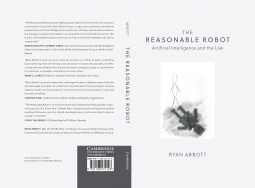
The Reasonable Robot
Artificial Intelligence and the Law
by Ryan Abbott
This title was previously available on NetGalley and is now archived.
Send NetGalley books directly to your Kindle or Kindle app
1
To read on a Kindle or Kindle app, please add kindle@netgalley.com as an approved email address to receive files in your Amazon account. Click here for step-by-step instructions.
2
Also find your Kindle email address within your Amazon account, and enter it here.
Pub Date Jun 25 2020 | Archive Date Oct 08 2020
Talking about this book? Use #TheReasonableRobot #NetGalley. More hashtag tips!
Description
From Skynet to the singularity, for better or worse, artificial intelligence (AI) is the future — but AI and people don’t compete on a level playing field, least of all in the eyes of the law.
For example: From a safety perspective, AI could be the best choice for driving a vehicle, but laws often prohibit driverless vehicles. At the same time, a person may be better at packing boxes at a warehouse, but a business may automate because AI receives preferential tax treatment. AI may be better at helping businesses to innovate, but businesses may not want to use AI if doing so restricts future intellectual property rights. These vital questions about how to regulate AI’s use and applications.
In The Reasonable Robot: Artificial Intelligence and the Law (Cambridge University Press, 2020), Ryan Abbott, Professor of Law and Health Sciences at the University of Surrey School of Law and Adjunct Assistant Professor of Medicine at the David Geffen School of Medicine at UCLA, argues that we would all be better off if the law did less to discriminate between people and AI. This work should be read by anyone interested in the rapidly evolving relationship between AI and the law, and you don’t need to be an expert in either to understand the content — Abbott breaks everything down into layman’s terms, which is a gift, because ultimately, these issues affect all of us one way or another.
“AI is stepping into the shoes of people and doing the sorts of things that only people used to do. In doing so, AI is often subject to different legal rules — and this creates problems because it tends to unintentionally favor people or machines,” Abbott explains. “We would have better outcomes applying similar legal rules to behavior by both people and AI.”
“AI is going to challenge legal standards in lots of ways people haven’t even thought about, and legal standards will also shape the way AI develops,” Abbott adds. “We need the right laws, and many people and perspectives providing input, to ensure AI is fully developed for social good.”
Bio:
Ryan Abbott, MD, JD, MTOM, PhD, is Professor of Law and Health Sciences at the School of Law, University of Surrey, and Adjunct Assistant Professor of Medicine at UCLA. A physician and patent attorney, Abbott’s research on law and technology has helped shape the international dialogue on these topics. He has served as an expert for the World Health Organization, the World Intellectual Property Organization, the European Commission, and the Parliament of the United Kingdom. Abbott also spearheaded the first patent applications to disclose inventions made autonomously by an AI. In 2019, he was named one of the 50 most influential people in Intellectual Property by Managing IP magazine. Learn more about Ryan Abbott at RyanAbbott.com.
A Note From the Publisher
Author is available for interviews, blog tours, autographed tours, autographed book giveaways, contests, and book club discussions.
Available Editions
| EDITION | Paperback |
| ISBN | 9781108472128 |
| PRICE | $24.00 (USD) |



